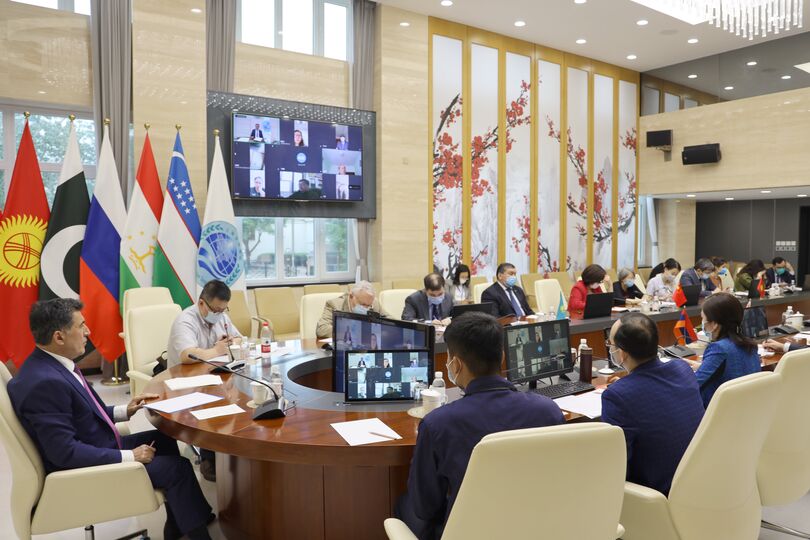On 15 May 2020, at the initiative of the SCO Secretariat with support from the China Institute of International Studies under the Chinese Foreign Ministry, a video conference was held on the COVID-19 pandemic's impact on the global economy and the role of international and regional organisations such as SCO in overcoming the coronavirus and the new socioeconomic and public threats presented by it.
The event was attended by analysts and experts of the Chinese Academy of Social Sciences, China Institute of Contemporary International Relations, Development Research Center of the State Council of the People's Republic of China, Shanghai Academy of Social Sciences, Institute of International Studies at Fudan University, Shaanxi Normal University's Institute of Central Asian Studies, Centre for Central Asian Studies at East China Normal University, and the Taihe Institute as well as by representatives of the SCO member states' diplomatic missions, observers and dialogue partners.
SCO Secretary-General Vladimir Norov stressed in his remarks the need for sharing opinions on the situation unfolding around the global pandemic and its fallout for the region and the overall SCO nations.
According to him, the pandemic has caused a crisis in the world economy and revealed grave issues in public healthcare.
The causes of the current crisis, unlike previous ones, are not rooted in finance, economy or politics. On the contrary, they are related to increasing risks that have acquired a cross-border nature and that have not been considered a threat to the entire humankind for a long time.
COVID-19 has had a powerful impact on international relations, too. In this regard, the priority is to overcome political confrontation and forego nationalist and populists ideas and protectionism. It is necessary to abide by the principle of multilateralism, while ratchet up the status and authority of international mechanisms under the auspices of the United Nations.
Of special significance is the task of pooling efforts to promptly design a vaccine, minimise damage to people's lives, mitigate the economic fallout and back up WHO's role in combating COVID-19.
Vladimir Norov also briefed attendees on the SCO and its Secretariat activities during the coronavirus pandemic. Thus, he gave a detailed report on the outcome of the SCO Foreign Ministers' video conference, which was chaired by Russia on 13 May 2020 during which the participants had a substantive exchange of opinions on SCO member states cooperation under the pandemic and coordination of efforts in overcoming its aftermath.
The Secretary-General informed participants about specific proposals made by ministers on furthering SCO cooperation in healthcare, trade, the economy and the joint fight against security challenges and threats.
In particular he noted the need to intensify SCO mechanisms in healthcare and to hold regular meetings of SCO member states health ministers and heads of services in charge of ensuring sanitary and epidemiological wellbeing, which are scheduled to take place in the near future.
Overcoming the socioeconomic aftermath of the pandemic and the effective use of the potential of the Programme of Multilateral Trade and Economic Cooperation of the SCO Member States until 2035 appear to be key tasks for the organisation.
In addition, the foreign ministers addressed the collateral threats posed by the pandemic. Socioeconomic problems, rising unemployment and poverty can trigger the spread of terrorism, drug trafficking and organised crime. The activities of the SCO Regional Anti-Terrorist Structure are vital in this context.
The SCO Secretariat drew the attention of attendees to the importance of establishing a Coordination Council for carrying out a joint fight against the threats of the epidemic as well as taking the necessary measures to counter challenges in cyber-security and the wide use of IT in all areas of state functioning. It would be worthwhile to engage the leading IT enterprises of SCO countries such as Alibaba Group, Mail.ru Group and other companies, which have shown practical efficacy of the use of information technologies during the pandemic.
Vladimir Norov noted that the SCO must be ready for the sweeping changes that may occur in the world economy and the system of international relations following the coronavirus. "In this sense, the challenges presented by the pandemic have unveiled new prospects for mutually beneficial cooperation within the SCO, the launch of extra possibilities, resources and reserves that so far have remained unused. All these aspects will be incorporated when the Action Plan for 202 ̶ 2025 on implementing the SCO Development Strategy until 2025 will be drafted," the SCO Secretary-General concluded.
During the discussion, Chinese experts spoke in favour of increasing the SCO role on the international arena in view of its political and economic potential and response capabilities to global and regional events. Most researchers were in agreement that member states must resist the politicisation of coronavirus issues and the distortion of the real situation in the SCO member states.
Special emphasis was paid to the importance of joint efforts to mitigate the socioeconomic fallout from the pandemic in order to to ensure stability and security in the SCO region. The discussion also focused on the need to activate the Organisation's mechanisms for supervising healthcare and sanitary epidemiological situation. Further improvements in the SCO legal framework concerning emergencies response were pointed out.
Emphasis was placed on the need to conduct an in-depth analysis of the performance of key SCO mechanisms.
Advantages of SCO's active cooperation with other international and regional organisations were also stressed.
The video conference participants spoke in favour of continuing dialogue within the SCO and expressed interest in permanent interaction with the SCO Secretariat.
